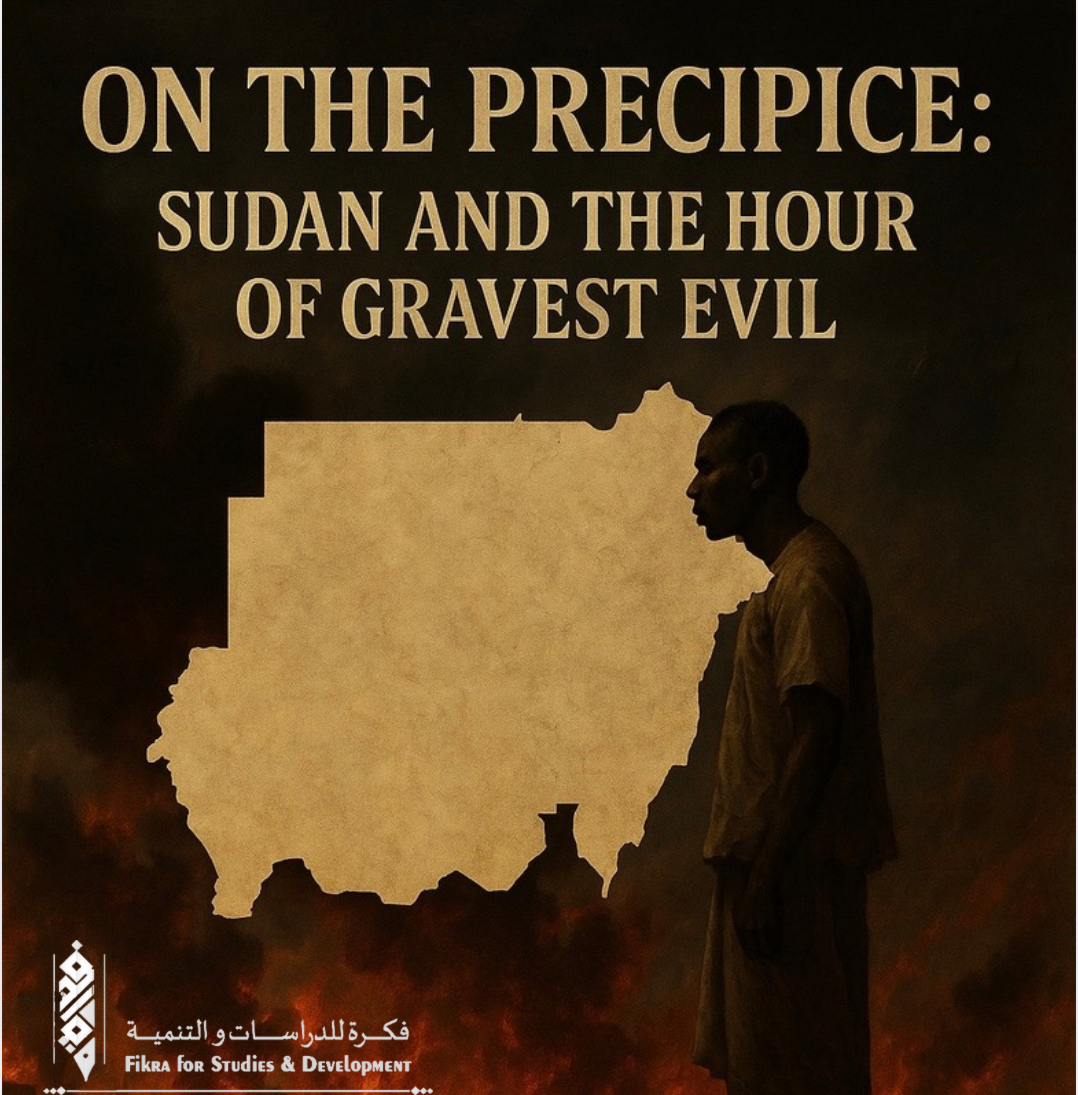On the Precipice: Sudan and the Hour of Gravest Evil
On the Precipice: Sudan and the Hour of Gravest Evil
Amgad Fareid Eltayeb
18 July 2025
In Sudan, the intersection of history and geography currently weaves a fabric of existential tragedy. This crisis not only inflicts unprecedented human suffering but also threatens to engulf the country in a maelstrom of chaos. Since April 2023, the war between the Sudanese Armed Forces and the Rapid Support Forces (RSF) militia, led by Mohamed Hamdan Dagalo (Hemiditi), has cast a dark shadow over the nation. This conflict has caused unprecedented crimes and violations in the country’s history, along with extensive destruction to its infrastructure, economy, and social bonds.
The complexity of war has been heightened by a vast “epistemic maze” of misinformation and alternative narratives that obscure the reality of the conflict. The complicity of the Taqaddum alliance’s rhetoric (now known as Sumood), led by former Prime Minister Abdalla Hamdok, with that of the Rapid Support Forces, has further complicated the scene. This complicity has provided a civilian cover for the militia’s ambitions under the guise of peace and civilian transformation.
This ongoing conflict in Sudan is no longer merely a military struggle for power. Instead, it poses an existential threat to the state itself, which is eroding under the weight of continuous violence. This erosion is fueled by the involvement of the civilian political elite, persistently justifying this violence through alternative narratives. These narratives feed the ambitions of the Rapid Support Forces militia to either rule the country or seize a part of it.
The collapse of the state, as warned by Thomas Hobbes in “Leviathan: The Natural and Political Origins of State Authority,” portends the absence of sovereignty. In such settings, the “social contract becomes fragile,” and life turns “brutish and short”. Hobbes wrote his book during the British op Civil War (1642-1651), arguing that strong, undivided government, which acquires absolute authority through commitments to serving the social contract, is essential to avoid internal wars. In this context, Sudanese civilian political entities bear a moral and historical responsibility to confront this danger. They must transcend their immersion in self-ambitions, foreign agendas, and indifference to the consequences of their actions to save Sudan from collapse.
Hobbes’s philosophical project seeks to redefine politics and its ends, moving away from absolute moral references like the concept of “summum bonum” (the greatest good). This concept is not only ambiguous but also impossible to exist, given the inherently divergent nature of human desires. What one individual considers good, another may consider evil. Therefore, political society’s attempt to achieve the “greatest good” leads to a conceptual and practical dilemma, as it quickly faces contradictory visions of good with no rational means of resolution. The inevitable result is conflict and strife.
Conversely, Hobbes posits that what can be agreed upon—or at least feared of—is the “greatest evil,” which includes violent death, crime, and the plunder of rights and property. These are universally considered unacceptable. Thus, the primary task of political society becomes not the pursuit of an unagreed-upon good, but the avoidance of an evil whose atrocity is universally recognized. The legitimacy of political authority, then, is founded on the fear of death, not the pursuit of happiness. Without a “greatest good” to build political consensus upon, the “state of nature”—existence outside the political organization of the state—is mere utter chaos, or as Hobbes describes it: “a war of all against all”. In such a state, with scarce resources and conflicting desires, there is no guarantee against individuals killing each other out of covetousness or even in defense of dignity. Even in the absence of actual violence, the fear of it persists, and only a permanent ruling authority can dispel it.
Based on this, Hobbes summarises his vision of a social contract in the following: “I relinquish my right to govern my own life in favor of this individual (the ruler), or this group (the state), provided that others relinquish the same right, and that we all defer to a single authority that regulates our actions and guarantees our safety“. This foundation of the state, as proposed by Hobbes, is not merely a brute force monopolizing legitimate violence. Instead, it is a rational contract where individuals surrender some freedoms to an authority that guarantees safety and order, ensures minimal justice, and regulates their relationships.
Militias, such as the Rapid Support Forces, do not represent legitimate political authority in the Hobbesian sense. They embody the very state of nature Hobbes sought to avoid, deriving their power from random violence and violating, rather than upholding, the social contract. Therefore, the rise of the RSF does not signify the construction of a “Sudanese Leviathan,” but rather a complete slide into a pre-state condition: a war of all against all.
The collapse of any state is not limited to the mere dismantling of institutions. It will also dismantle the institutional bonds that unite the nation and provide stability for its citizens. As Max Weber noted, the state is the entity that holds the “legitimate monopoly of violence,” and losing this monopoly opens the door to chaos. Historical experiences, such as Somalia in the 1990s and Afghanistan after the Soviet withdrawal, demonstrate the consequences of state collapse. These include a governance vacuum filled by warlords, regional fragmentation fueling ethnic conflicts, and social disintegration undermining any hope for national unity. In Sudan, signs of this danger are increasingly apparent with the RSF’s plans to form a parallel government in western Sudan, announced in Nairobi in March 2025, which portends an actual division of the country.
The consequences of state collapse in Sudan extend beyond its national borders. Sudan’s strategic location, overlooking the Red Sea and surrounded by seven countries, makes it a regional pillar. Its collapse would destabilize neighboring countries like Chad, South Sudan, and Ethiopia, which already host millions of Sudanese refugees. Lebanon’s civil war (1975-1990) demonstrated how state collapse leads to the flow of weapons and fighters across borders, fueling regional conflicts and fostering organized crime like drug trafficking and human smuggling networks, in addition to widespread human suffering. In Sudan, foreign interventions, particularly by the UAE, aimed at serving their countries’ interests at the expense of the Sudanese people, will further complicate the scene. This necessitates international intervention to stop pouring more foreign fuel on the Sudanese war fires.
On the humanitarian front, Sudan is experiencing an unprecedented catastrophe. The conflict has displaced approximately 10 million internally and created 4.1 million refugees. Famine is sweeping Darfur, South Kordofan, and Blue Nile, with 25.6 million people suffering from acute food insecurity. The absence of the state will exacerbate this suffering and increase the number of people needing assistance. Warlords, who would dominate the scene and fill the governance vacuum, would also impede humanitarian relief efforts and aid distribution, using them for militia recruitment. Something that RSF is already doing now.
Amidst these potential catastrophic scenarios, military conditions are deteriorating at an alarming rate. In El Fasher, the last stronghold of the armed forces in Darfur, the intensive siege by the Rapid Support Forces continues since May 2024. Air and ground attacks have targeted the city and displacement camps such as Zamzam and Abu Shouk. Humanitarian reports document atrocities, including ethnically motivated killings, widespread rapes, and sexual violence, raising concerns of ethnic cleansing. In North Kordofan, attacks on El Obeid are escalating. Though the armed forces succeeded in ending a nearly two-year siege in February 2025, the Rapid Support Forces continue to shell the city, killing dozens. Recently, in Umm Samima, the army successfully regained control after its occupation by the Rapid Support Forces, reflecting escalating military operations. In eastern Al-Jazirah, retaliatory attacks by the Rapid Support Forces, following the defection of one of its commanders (Abu Agla Kikel) in October 2024, resulted in the deaths of 124 civilians and the displacement of over 119,400 people. Zamzam camp experienced a devastating attack in April 2025, killing over 200 civilians, amidst ongoing and worsening famine confirmed by the United Nations.
In light of this reality, civilian political entities bear a historical responsibility. As Jean-Jacques Rousseau noted in “The Social Contract,” political organizations embody the general will in service of public interests. The absence of this will opens the door to tyranny or chaos. Sudanese political forces should cease considering themselves owned by individuals and dedicated to serving partial interests or the desires and ambitions of their leaders, as is currently the case. They must recognize that their fundamental duty, and indeed the justification and legitimacy of their existence, depends on expressing the collective orientations of their members in serving important collective interests. The danger of state collapse, which harms everyone, fundamentally deprives them of these justifications and legitimacy.
What Sudan needs now from its political forces is to stop justifying the RSF war to serve their political interests or achieve their authoritarian ambitions through force of arms. The Rapid Support Forces have failed to present any model of governance that serves the masses. Their actions include genocidal massacres in El Geneina, systematic looting, killing, and widespread rape during their control of Khartoum and Al-Jazirah before their liberation by the army. Furthermore, they have caused instability, gang rule, and chaos in Nyala, prevented students from taking exams across Darfur, and looted humanitarian aid. Reports of increasing rapes in Zalingei also highlight their brutality. Everywhere the RSF has reached, they have failed to coexist with people, instead practicing barbaric violations of their rights with widespread chaos. The Rapid Support Forces have thus provided a complete example of the greatest evil that politics should strive to avoid, according to Hobbes’s concept.
Sudan now stands at a crucial crossroads. State collapse is not just a possibility but a looming danger that threatens to swallow the nation’s hopes for peace, democracy, and justice, which were championed in the December revolution. The atrocities in El Fasher, Zamzam, El Geneina, Khartoum, and Al-Jazirah are merely symptoms of the disease of the Rapid Support Forces militia’s control: the absence of the state as a guarantor of security and justice. Civilian entities must assume their responsibility and cease creating epistemic mazes about the nature of the war in Sudan to conceal the extent of their poor positions, which need review to save Sudan from the fate of Somalia or Yemen. The Sudanese people, who have sacrificed dearly for freedom, deserve civilian leadership that prioritizes avoiding the greatest evil to rebuild a state embodying their aspirations for justice and dignity.


